过去分词作宾补
高三英语过去分词做宾语补足语
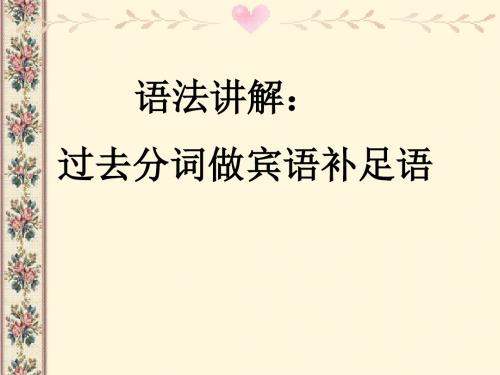
D: 位于介词with/without 之后 With everything well arranged, he left the office. The woman was worrying with her ticket lost. He left the office without work done yesterday.
1) 表示让某事被别人做 I had my computer repaired. 2) 表示“受…的影响,蒙受….的损失”。 He had his leg broken in the match yesterday.
C: 表示希望意义的词 : want , wish, like, expect等
此时宾语补足语与间接宾语的关系绝 大多数是被动或完成的. e.g. We like the problem settled.
; 恒耀娱乐 恒耀娱乐公司 ; 2019.1 ;
突围." 李小克给他点上烟,两人坐在一起吐着烟圈. "耶夫洛夫,还是想想现在吧.我们歼灭了一小股党卫军,位置已经暴露,敌人必然很快就要向我们进攻.我们的总兵力有三千,那是很大的数目.德国人到底有多少我不知道,但是他们一定部署在森林外,其目的就是堵截我军大部队的突围." "所 以我们现在反而非常危险?"耶夫洛夫问道. "对,德军会包围我们.我们要么继续撤退,要么就地防御." "你的意见呢?" "就地防御.以逸待劳.德国人可能会走公路到罗莎斯卡亚调查,也可能直接在林间行动.我们必须以目前所在地到罗莎斯卡亚组织防线.要么我们全体转移到它个村子组织防御." 耶夫洛夫立刻下令所有下级军官开会,他马上报告了事态的严
人教版高中英语必修五过去分词作宾语补足语
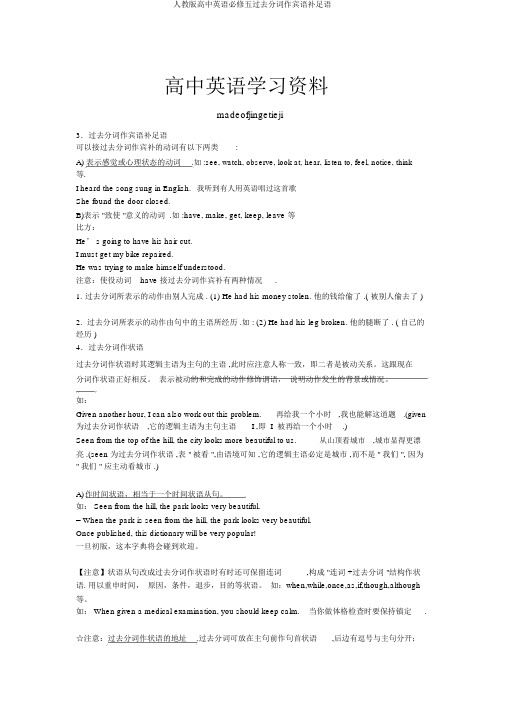
高中英语学习资料madeofjingetieji3.过去分词作宾语补足语可以接过去分词作宾补的动词有以下两类:A) 表示感觉或心理状态的动词.如 :see, watch, observe, look at, hear, listen to, feel, notice, think 等.I heard the song sung in English.我听到有人用英语唱过这首歌She found the door closed.B)表示 "致使 "意义的动词 .如 :have, make, get, keep, leave 等比方:He’ s going to have his hair cut.I must get my bike repaired.He was trying to make himself understood.注意:使役动词have 接过去分词作宾补有两种情况.1.过去分词所表示的动作由别人完成 . (1) He had his money stolen. 他的钱给偷了 .( 被别人偷去了 )2.过去分词所表示的动作由句中的主语所经历 .如 : (2) He had his leg broken. 他的腿断了 . ( 自己的经历 )4.过去分词作状语过去分词作状语时其逻辑主语为主句的主语 ,此时应注意人称一致,即二者是被动关系。
这跟现在分词作状语正好相反。
表示被动的和完成的动作修饰谓语,说明动作发生的背景或情况。
如:Given another hour, I can also work out this problem.再给我一个小时,我也能解这道题.(given 为过去分词作状语,它的逻辑主语为主句主语I ,即 I 被再给一个小时.)Seen from the top of the hill, the city looks more beautiful to us.从山顶看城市,城市显得更漂亮 .(seen 为过去分词作状语 ,表 " 被看 ",由语境可知 ,它的逻辑主语必定是城市 ,而不是 " 我们 ", 因为" 我们 " 应主动看城市 .)A)作时间状语,相当于一个时间状语从句。
初中英语过去分词作宾语补足语精讲
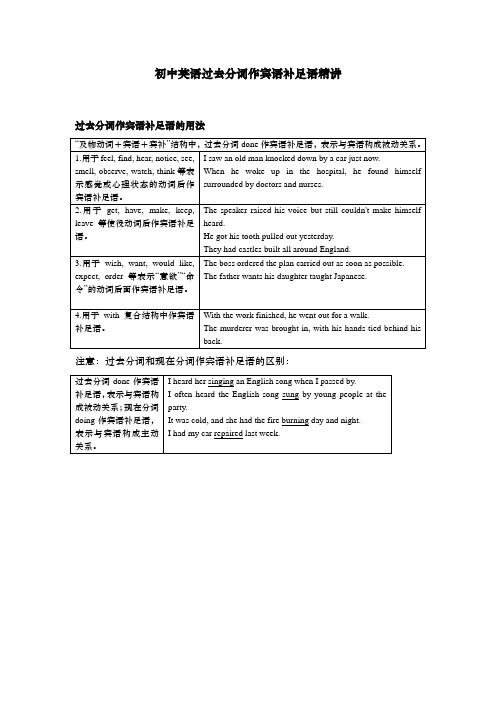
注意:过去分词和现在分词作宾语补足语的区别:
过去分词done作宾语补足语,表示与宾语构成被动关系;现在分词doing作宾语补足语,表示与宾语构成主动关系。
I heard hersingingan English song when I passed by.
The boss ordered the plan carried out as soon as possible.
The father wants his daughter taught Japanese.
4.用于with复合结构中作宾语补足语。
With the work finished, he went out for a walk.
The speaker raised his voice but still couldn't make himself heard.
He got his tooth pulled out yesterday.
They had castles built all around England.
3.用于wish, want, would like, expect, order等表示“意欲”“命令”的动词后面作宾语补足语。
I often heard the English songsungby young people at the party.
It was cold, and she had the fireburningday and night.
I had my carrepairedlast week.
必修5过去分词作宾补
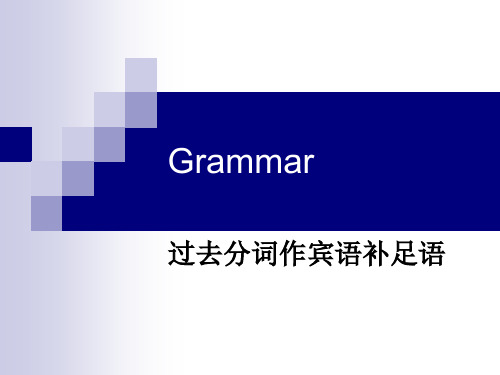
2 .感官动词feel, find, hear, notice, see, watch (smell ,taste , observe)等 表示感觉和心理状态的动词之后, 表:“感受到某人或某事被做”。
I was sleeping when I heard my name called.
He was disappointed to find his suggestions turned down.
课本例句
1). Now when people refer to England you find Wales included as well.
2).Finally … by getting Ireland connected in the same peaceful way. 3).You find most of the population settled in the south,…
过去分词与不定式,现在分词作宾补 的区别
不定式,现在分词与宾语在逻辑上都是
主谓关系;过去分词与宾语在逻辑上是 动宾关系。 不定式强调动作发生的全过程;现在分 词强调正在进行的状态。 I saw her come into the classroom.我 看见她进教室了。
I
saw her coming into the classroom. 我看见她正进教室。 I saw her taken out of the classroom. 我看见她被人从教室里带了出来。
The murderer was brought in, with his hands tied behind his back. 凶手被带进来了,他的双手被绑在背后。 (表方式)
ቤተ መጻሕፍቲ ባይዱ
过去分词作宾补
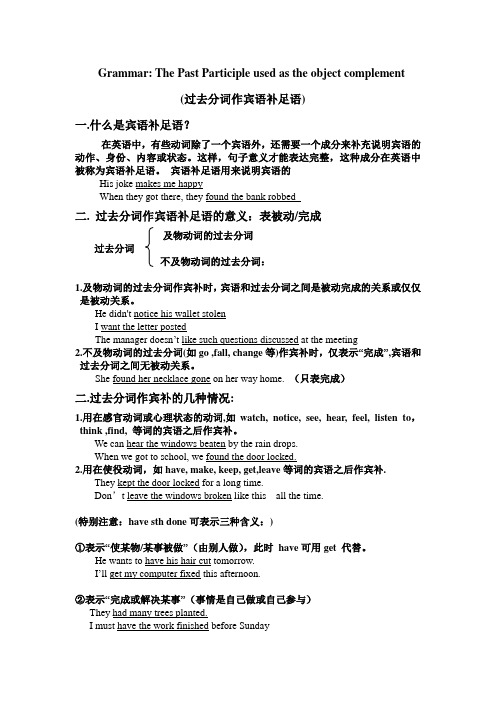
Grammar: The Past Participle used as the object complement(过去分词作宾语补足语)一.什么是宾语补足语?在英语中,有些动词除了一个宾语外,还需要一个成分来补充说明宾语的动作、身份、内容或状态。
这样,句子意义才能表达完整,这种成分在英语中被称为宾语补足语。
宾语补足语用来说明宾语的His joke makes me happyWhen they got there, they found the bank robbed二. 过去分词作宾语补足语的意义:表被动/完成及物动词的过去分词过去分词不及物动词的过去分词:1.及物动词的过去分词作宾补时,宾语和过去分词之间是被动完成的关系或仅仅是被动关系。
He didn't notice his wallet stolenI want the letter postedThe manager doesn’t like such questions discussed at the meeting2.不及物动词的过去分词(如go ,fall, change等)作宾补时,仅表示“完成”,宾语和过去分词之间无被动关系。
She found her necklace gone on her way home.(只表完成)二.过去分词作宾补的几种情况:1.用在感官动词或心理状态的动词,如watch, notice, see, hear, feel, listen to,think ,find, 等词的宾语之后作宾补。
We can hear the windows beaten by the rain drops.When we got to school, we found the door locked.2.用在使役动词,如have, make, keep, get,leave等词的宾语之后作宾补.They kept the door locked for a long time.Don’t leave the windows broken like this all the time.(特别注意:have sth done可表示三种含义:)①表示“使某物/某事被做”(由别人做),此时have可用get 代替。
过去分词作宾语补足语
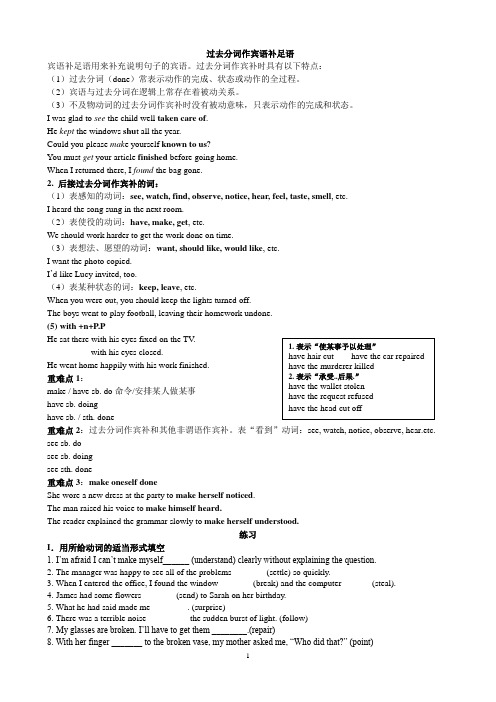
过去分词作宾语补足语宾语补足语用来补充说明句子的宾语。
过去分词作宾补时具有以下特点:(1)过去分词(done )常表示动作的完成、状态或动作的全过程。
(2)宾语与过去分词在逻辑上常存在着被动关系。
(3)不及物动词的过去分词作宾补时没有被动意味,只表示动作的完成和状态。
I was glad to see the child well taken care of .He kept the windows shu t all the year.Could you please mak e yourself known to us ?You must get your article finished before going home.When I returned there, I found the bag gone.2. 后接过去分词作宾补的词:(1)表感知的动词:see, watch, find, observe, notice, hear, feel, taste, smell , etc.I heard the song sung in the next room.(2)表使役的动词:have, make, get , etc.We should work harder to get the work done on time.(3)表想法、愿望的动词:want, should like, would like , etc.I want the photo copied.I ’d like Lucy invited, too.(4)表某种状态的词:keep, leave , etc.When you were out, you should keep the lights turned off.The boys went to play football, leaving their homework undone.(5) with +n+P.PHe sat there with his eyes fixed on the TV . with his eyes closed. He went home happily with his work finished. 重难点1: make / have sb. do 命令/安排某人做某事 have sb. doing have sb. / sth. done重难点2:过去分词作宾补和其他非谓语作宾补。
过去分词作宾补(精)
过去分词作宾补一. 过去分词作宾补, 表示动作已经完成或结束. 能用作宾补的过去分词一般都是vt , 表示被动意义或已完成的意义, 有时两者兼之, 作宾补的过去分词与宾语之间有逻辑上的动宾关系, 即宾语是过去分词动作的对象.eg. After walking up , I found everyone gone .The speaker raised her voice to make herself heard.They found their new bikes stolen.二.需要过去分词作宾补的情况:1. 使役动词 get ,have , keep , leave 等后,可用过去分词作宾补,“致使某人或某事被……” eg. We should keep them informed of what is going on here.Jane got her bad tooth pulled out at the dentist’s .I had my record repaired.2. 感官动词feel ,find , hear, notice, see, watch 等表示感觉和心理状态的动词之后,表“感受到某人或某事被做”。
eg. I was sleeping when I heard my name called .She found his room cleaned.I saw him bitten by a dog.Fill in the blank .I heard someone _____________ me .I heard my name ______________.I found Tom __________ the window.I found the window___________.3. 表示“意欲,命令”的动词如:like , order , want , wish , 相当于过去分词短语前省略了 to be, 表示“希望/要求某人或某事被做”。
过去分词作宾补(定稿)
1. 2. 3. 4. 5. 6.
I found the job easy. We make him our monitor. We heard someone go into the room. My mother allows me to watch TV . He treated his mistake as a joke. I think it wrong to turn down his
• see sb. doing: 表示动作正在进行。 • see sb. do : 表一个完成的动作,强调 动作发生的全过程 • see sth. done: 表示被动或完成。
A B 1. I saw him __________ the window. 2. I saw the window ___________. C • A. open B. opening C. opened 3. I hear him A the song every day. 4. I hear the song C every day. • A. sing B. singing C. sung
表示“致使某人或某事被做” B.I had my bike repaired. C. Yesterday I had my hair cut. D. He got his TV set mended.
希望,愿望或要求 ”等意义的词, (3)表示“_________
如:_______________________等 want, wish, like, expect, order
1.watch/hear/feel/find等表示感觉和心里状 态的动词 + 名词/代词 + 过去分词 表示“感受到某人或某事被做”。 2. have /get/make表示使役的动词 + 名词/ 代词+过去分词 表示“致使某人或某事被做” 3. want/wish/like等表示希望愿望的动词+ 名 词/代词 + 过去分词 表示“希望/要求某人或某事被做” 4 keep /leave表示保持的的动词 +名词/代词 + 过去分词 表示“保持某人或某事被做”
过去分词作宾补
过去分词作宾补过去分词作宾补⼀.过去分词作宾补,表⽰动作已经完成或结束.能⽤作宾补的过去分词⼀般都是vt , 表⽰被动意义或已完成的意义,有时两者兼之,作宾补的过去分词与宾语之间有逻辑上的动宾关系,即宾语是过去分词动作的对象. eg. After walking up , I found everyone gone .The speaker raised her voice to make herself heard.They found their new bikes stolen.⼆.需要过去分词作宾补的情况:1. 使役动词get ,have , keep , leave 等后,可⽤过去分词作宾补,“致使某⼈或某事被……”eg. We should keep them informed of what is going on here.Jane got her bad tooth pulled out at the dentist’s .I had my record repaired.2. 感官动词feel ,find , hear, notice, see, watch 等表⽰感觉和⼼理状态的动词之后,表“感受到某⼈或某事被做”。
eg. I was sleeping when I heard my name called .She found his room cleaned.I saw him bitten by a dog.Fill in the blank .I heard someone _____________ me .I heard my name ______________.I found Tom __________ the window.I found the window___________.3. 表⽰“意欲,命令”的动词如:like , order , want , wish , 相当于过去分词短语前省略了to be, 表⽰“希望/要求某⼈或某事被做”。
过去分词作宾补的四种情况
过去分词作宾补的四种情况过去分词作宾补的情况一:表示感觉或心理状态当我们在学习英语语法的时候,过去分词作宾补是一个很重要的知识点。
今天咱们就来聊聊过去分词作宾补表示感觉或心理状态的情况。
比如说,“I was surprised to find my room cleaned.”(我惊讶地发现我的房间被打扫干净了。
)在这个句子里,“cleaned”就是过去分词作宾补,它让我们感受到了“我”那种意外和惊喜的心情。
再比如,“She felt disappointed at the result.”(她对结果感到失望。
)“disappointed”在这里补充说明了“she”的感受。
我有个朋友叫小李,他一直期待能在考试中取得好成绩。
当成绩出来的时候,他发现自己考得很差,心里觉得非常 frustrated(沮丧的)。
这种感觉就像是心里有一块大石头压着,让他喘不过气来。
还有一次,我去参加一个聚会。
本来满心欢喜地以为会玩得很开心,结果发现大家都不太搭理我,那一刻我 felt left out(被忽视的),那种滋味可不好受。
所以啊,过去分词作宾补表示感觉或心理状态,能让我们更生动地表达自己的内心世界,让别人更好地理解我们的感受。
过去分词作宾补的情况二:表示使役咱接着说过去分词作宾补,这次来聊聊表示使役的情况。
比如说,“Have the work finished five o'clock.”(五点之前把工作完成。
)这里的“finished”就是过去分词作宾补,表示让工作被完成。
再举个例子,“He got his bike repaired.”(他让人修了他的自行车。
)“repaired”表明自行车被修理了。
我邻居王大爷的电视坏了,他请了个师傅来修, got his TV repaired,又能愉快地看电视啦。
还有我同学小张,头发太长了,就去理发店 had his hair cut,整个人都精神了不少。
有一回我家灯不亮了,我赶紧找人 had the light fixed,不然晚上可就黑漆漆的啦。
- 1、下载文档前请自行甄别文档内容的完整性,平台不提供额外的编辑、内容补充、找答案等附加服务。
- 2、"仅部分预览"的文档,不可在线预览部分如存在完整性等问题,可反馈申请退款(可完整预览的文档不适用该条件!)。
- 3、如文档侵犯您的权益,请联系客服反馈,我们会尽快为您处理(人工客服工作时间:9:00-18:30)。
Grammar Unit2 过去分词作宾补过去分词作宾补用法归纳英语中过去分词可作宾补,即:过去分词放在宾语(名词或代词)后面作补语,构成复合宾语,(此时的过去分词一般是及物动词)表被动意义或完成意义,有时两者兼而有之。
做宾补的过去分词与宾语有逻辑上的动宾关系,即宾语是过去分词动作的对象。
1)表示感觉或心理状态的动词。
如:see, watch, observe, find, hear, feel, notice, 等。
①We saw the thief caught by the police.②People found the water polluted.③Have you heard a pop song sung in English?④I heard my name called.⑤The rich man felt himself cheated.⑥We can hear the windows beaten by the heavy rain drops.我们可以听到大雨敲打窗户的声音。
⑦I observed all the rooms broken into.注意:see, hear, watch, notice 等动词后既可以加v-ing 也可以用do(不带to的不定式),还可以跟done,但三者之间有区别: 用v-ing 表示动作正在发生,即发生的过程还没有结束; 用do强调动作发生的全过程,即动作全过程结束了,用done 表示宾语与宾补之间时被动的关系①I saw her come into the classroom.我看到他进了教室。
②I saw her coming into the classroom.我看他正在走进教室。
③I saw her taken out of the classroom.我看到她被带出了教室。
2)表示“致使”意义的动词。
如:have, make, get等。
如:make sth. done:让……被……make oneself done. 让某人自己被…….或( 让别人……)get sth. donehave sth. done温馨提示:让某人做某事:have sb. do sth./ get sb. to do sth.①We have made our views known to them.我们已经使他们知道了我们的观点。
②As he knows very little English, he finds it difficult to make himselfunderstood.③I’ll have my hair cut tomorrow. 明天我要理发。
④He got his tooth pulled out yesterday. 他昨天把牙拔了。
⑤They managed to make themselves understood using very simpleEnglish.⑥we will make ourselves understood in one day.⑦He stood on the bench to make himself seen when he made anannouncement.⑧The little girl cried out to make herself noticed by the passers-by.Speak a little louder to make yourself heard.说话大声一点,让我们都能听到。
3)表保持某种状态的动词:keep, leave等。
keep /leave + n. /pron. + p.p①Don’t leave those things undone. 要把那些事情做完。
②We mustn’t leave the work unfinished. 我们不能让工作半途而废。
③Please keep me informed of the latest news.请随时把最新消息告诉我。
④Keep your eyes closed for a moment.闭上眼睛一会儿。
⑤They kept the door locked for a long time.温馨提示:使役动词have接过去分词作宾补的3种情况。
a)过去分词所表示的动作由他人完成。
等于get sth. doneThey are having their house painted.他们正在请人油漆房屋。
b)过去分词所表示的动作由句子的主语完成或句子的主语可能参与。
等于get sth. doneI must have/get my homework finished first before going out to play.在出去玩之前,我一定得把我的作业完成。
We must have/get the task finished by Monday.我们必须在星期一以前完成这项任务。
c)过去分词所表示的动作由句中的主语所经历(主语遭遇某种不幸)。
如:He had his leg broken.他的腿断了。
He had his money stolen.他的钱给偷了。
(被别人偷去了)4)表“希望,要求,命令”的动词:want, wish, expect, would like, order+ (to be) done①I want the work (to be) finished by Sunday.②Jim ordered the room (to be) cleaned.③I wish the problem settled at once.④I would like my house (to be) painted white.5)with +宾语+过去分词”结构“with +宾语+过去分词”结构中,过去分词用作介词with的宾语补足语。
这一结构通常在句中作时间、方式、条件、原因等状语。
例如:①The murderer was brought in, with his hands tied behind his back. 凶手被带进来了,他的双手被绑在背后。
(表方式)②With water heated, we can see the steam.→If water is heated, we cansee the steam.水一被加热,我们就会看到水蒸气。
(表条件)③With the matter settled, we all went home. 事情得到解决,我们都回家了。
(表原因)④She stood in front of him, with her eyes fixed on his face. 她站在他面前,眼睛注视着他。
⑤They left without a dish touched.⑥He left the office with the door unlocked.⑦With everything well arranged, he left the office.注意:with+宾语(名词或代词)+宾补(adj. /adv./介词短语/v-ing/ v-ed/to do)with sth. to do :有某事要做(表将来,不能用with sth. to be done)①With all the problems solved, he felt relaxed.②With all the problems to solve, the new president will have a hard time.③With all the noise going on, I couldn’t concentrate on my study.练习:1)He likes to sleep with the window_________.(窗户开着) open2)He likes to sleep with the lights_______.(灯开着)on3)He likes to sleep with his hands ____________.(手放在胸前)on the chest 4)He likes to sleep with the bedroom________.(锁着)locked5)He likes to sleep with the fire ____________.(火炉燃烧着)burning6)With much work ______(do) today, he hurried to the company. to do 注意:在这一结构中,当宾语为某一身体部位,且作宾补的动词是及物动词时,身体部位通常是过去分词的逻辑宾语,因而过去分词不可换用现在分词。
e.g. She sat on the sofa, with her attention fixed on her novel.当用某些不及物动词的分词形式作身体部位的宾补时,用现在分词的形式。
e.g. :She felt her heart beating fast.练习:1.The manager discussed the plan that they would like to see____ the next year.A.carry outB. carryingC. carried outD. to carry outcarry out:实施(计划),履行(义务、约定),进行(实验)2. In the past few years, we have had thousands of trees____ around out school.A. plantB. planted c. planting D. being planted3. She was glad to see her child well ____ care of.A. takeB. to be takenC. takenD. taking4. The result of the entrance exams was not made ___ to the public until last Thursday.A. knowing B knownC. to knowD. to be known5. He found them ____ at table___.A. sat; to play chessB. sitting; to play chessC. seated; playing chessD. seat; play the chess6. I can make you ___ what I say, but you can’t make yourself ____ in English.A.understand; understandB. understand; understoodC. to understand; understandD. understand; to be understood7.Mrs. Brown was very disappointed to see the washing machine she had had___ went wrong again.A. itB. it repairedC. repairedD. to be repaired8. Is this the recorder you want ____?A. to have repairedB. to repairedC. to have it repairedD. it repaired9.She was disappointed to find her suggestion _________.A. turning downB. to be turned downC. turned downD. to turn downturn down:拒绝10.As soon as she entered the room, the girl caught sight of the flower _______by her mother.A. buyingB. being boughtC. were boughtD. bought11.The director had her assistant some hot dogs for the meeting.A. picked upB. picks upC. pick upD. picking uppick up:开车去接某人;接收,收听(广播);(偶然)学会;(廉价地)买到;(健康等)恢复;拿起;购买;收拾,整理12.She wants her paintings in the gallery, but we don’t think they would be very popular.A. displayB. to displayC. displayingD. displayedgallery:['gæləri] 画廊,美术馆13.She doesn’t want the children ____ out in such weather.A. takeB. to takeC. takenD. taking14.Can you have the washing-machine ______ to my house?A. sendB. to sendC. sentD. sending15. --- Good morning. Can I help you?--- I'd like to have this package _____, madam.A. be weighedB. to be weighedC. weighD. weighed16. Alexander tried to get his work _______in the medical circles.A. to recognizeB. recognizingC. recognizeD. recognizedrecognize:认定,认可in the medical circles:在医学领域17. John rushed out in a hurry, ___ the door_____.A. left; unlockedB. leaving; unlockingC. leaving; unlockedD. to leave; unlocking18. With all the magazines I needed ______ , I left the post office .A. buyingB. boughtC. to buyD. to be bought19.It is wise to have some money______ for old age.A.put awayB. kept upC. given awayD. put up20. I have often heard the ABC song____, but I have never heard Alice ____ it.A. to be sung; to singB. being sung; sangC. sung; singD. sang; singing21. In the dream Peter found himself by a fierce wolf, and he woke suddenly .A. chasedB. to be chasedC. be chasedD. having been chased chase: [tʃeɪs] vt. 追逐;追赶1-5CBCBC 6-10BCACD 11-15 CDCCD 16-20DCBAC 21A。
